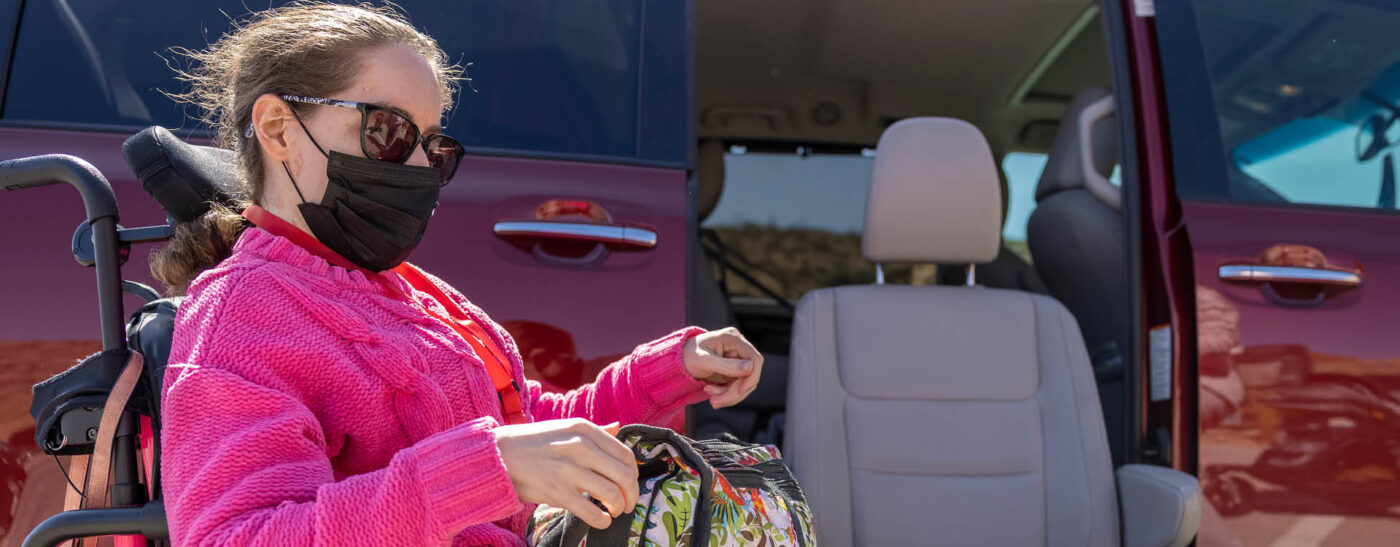Whether you plan to make a short trip across town for supplies and then stay home with a good book, or travel across the country to spend time with family, we wish you safe and stress-free travels. Here are a few tips to get you where you want to go safely and with a minimum of stress:
Plan Ahead
Whether you're flying or driving, plan your trip well in advance.
Flying
If you need assistance or are traveling with a service animal, notify your airline when you book your flight, or a minimum of 48 hours before your flight departs. Airline policies and procedures may vary, so be sure to plan with your airline in advance.
The Air Carrier Access Act prohibits discrimination on the basis of disability in air travel. Know both your rights and responsibilities before planning.
Public Transportation
If you plan to use public transportation, plan ahead to explore the transportation options, routes, and schedules that could work best for you.
- Use the Eldercare Locator to learn about transportation options and other resources in your community. Simply enter your zip code for results.
- The American Public Transportation Association website provides links to both state and local transportation links in communities across the United States.
Driving
Driving your own vehicle when traveling can ease a lot of the stress around flying and public transportation. But what are the disability parking rules in other states?
This state-by-state disability parking guide can help you plan ahead.
Ridesharing Services
An alternative to traditional rideshare service for people with disabilities and older adults has become available throughout Wisconsin.
- CarePool matches drivers who are compatible with passenger needs and knows the details before arrival.
Before using a traditional ridesharing service, such as Uber or Lyft, get to know their policies and procedures around serving people with disabilities.
- RIDEGURU provides a useful overview of how Uber and Lyft provide accommodations for people with disabilities.
Be Prepared for Medical Needs and Emergencies
Just knowing you’re prepared for unexpected medical needs and emergencies can ease stress.
Medications and Supplements
If you take medications or supplements, make sure you have enough of what you need to last through the holidays. Be sure to carry your important medical information with you:
- the name and contact information for who you’d like contacted in case of an emergency,
- your doctor's and other health professional's contact information,
- a list of your prescriptions and supplements, along with your pharmacy contact information, and
- a copy of your eyeglass or contact lens prescription.
Medical Resources and Associations
Check out the medical resources and associations in the community you’ll be visiting. If necessary, what hospital or urgent care facility would you go to? Is there a local medical association that could provide resources if needed? For example, what resources could the local Spina Bifida Association provide?
Stick with Routines that Work for You
Sticking with your routines, even if they’re modified, can keep you on an even keel physically, mentally, and emotionally when traveling.
Try to stay with the routines that work for you at home. If your day typically goes better when you rest in the afternoon, then try to take some afternoon rest time while you’re visiting over the holidays. If you like to exercise regularly at home, then add in a modified exercise routine while away from home.
Be Flexible and Keep a Sense of Humor
As much as we plan ahead, life has a way of giving us unexpected twists and turns. Plan and then be flexible, so that if the unexpected happens you can work through the changes with a minimum of stress. And, remember to keep your sense of humor. As Madeline L’Engle said, “A good laugh heals a lot of hurts."
We hope these tips help you have safe and stress-free travels, doing the things you enjoy and being with those you love.





